|
|
|
Sort Order |
|
|
|
Items / Page
|
|
|
|
|
|
|
| Srl | Item |
| 1 |
ID:
165243


|
|
|
|
|
| Summary/Abstract |
This article assesses China–Pakistan-Afghanistan relations in the period 2014–2018 and asks whether China has exercised distinct pressure on Pakistan to be a more constructive partner for Afghanistan. A central argument is that even as China has failed to alter Pakistan’s policies significantly in the short term it is still continuing to successfully build power and trust in Pakistan and Afghanistan, as well as with their neighbours to the north and west. This bodes well for China’s exercise of regional leadership in a long-term perspective.
|
|
|
|
|
|
|
|
|
|
|
|
|
|
|
|
| 2 |
ID:
165248
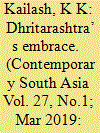

|
|
|
|
|
| Summary/Abstract |
Why do we find more parties from Tamil Nadu in the Lok Sabha compared to Kerala and why are there more parties in the legislative assembly in Kerala compared to Tamil Nadu? This incongruence is puzzling since elections to both levels of government, federal and state, are based on the single-member simple plurality electoral system and the territorial boundaries of the state, and therefore the societal environment remains constant. This article argues that this incongruence is not merely the product of the federal parliamentary structure of the polity, electoral rules, and socio-economic factors but because of what parties do. This article gives agency to parties and brings party strategy to the centre of the analysis.
|
|
|
|
|
|
|
|
|
|
|
|
|
|
|
|
| 3 |
ID:
165242
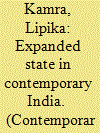

|
|
|
|
|
| Summary/Abstract |
This paper explores the ‘expanded state’ in post-liberalisation India within the context of official responses to the Maoist insurgency in rural central and eastern India. I analyse a scheme called the Prime Minister’s Rural Development Fellowship, which was launched as part of the central government’s attempt to wean ordinary men and women away from Maoist insurgents through rural development. Under this scheme, young women and men are appointed to assist state officials in implementing rural development programmes in districts classified as ‘Left-Wing Extremist’. What does the institution and practice of this fellowship tell us about the state in India today in the context of counterinsurgency and beyond? I address this question on the basis of ethnographic fieldwork in an erstwhile Maoist district in the eastern Indian state of West Bengal. By closely shadowing the everyday work of one Prime Minister’s Rural Development Fellow (PMRDF), I show how the PMRDF is located outside the state, and yet constitutes the state. By focussing on the role of the PMRDF, I reveal one of the many new configurations of the state that are emerging in India today.
|
|
|
|
|
|
|
|
|
|
|
|
|
|
|
|
| 4 |
ID:
165244
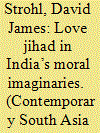

|
|
|
|
|
| Summary/Abstract |
This paper examines moral panics about love jihad in contemporary India. Since 2009, right-wing Hindu activists have alleged that members of the Muslim community are conspiring to marry Hindu women, convert them to Islam, and have Muslim children. Love jihad, according to these activists, threatens to both make Hindus a minority and, consequently, undermine the Hindu religion. I argue that moral panics about love jihad not only serve to marginalize Muslims as ‘bad citizens,’ but also promotes the gendered moral obligations of the Hindu patriarchal family as civic duty. I consider the ways that the citizen family imagined by anti-love jihad activists complicates some contemporary theorizations of the individualized political subject promoted by neo-liberal governance.
|
|
|
|
|
|
|
|
|
|
|
|
|
|
|
|
| 5 |
ID:
165251
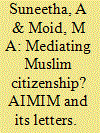

|
|
|
|
|
| Summary/Abstract |
Many scholars of the Indian State now argue that, given its limited resources and capacities to recognize and service its citizen-subjects, it relies on numerous mediators, including political parties, to administer, govern and rule its populace. The discourse of Indian citizenship meanwhile has moved towards the principle of ethnicity, making Muslim citizenship – as a legal status, a bundle of rights and entitlements, or a sense of identity and belonging (Jayal, 2013, Citizenship and Its Discontents: An Indian History. Ranikhet: Permanent Black, 2) – an increasingly fraught terrain. Located in this theoretical context, our paper examines the political mediation process put in place by the Hyderabad based Muslim political party, the All India Majlis-e-Ittehadul Muslimeen (AIMIM). Drawing on fieldwork at its office, known as Darussalam, during 2010–2011, we argue that this organized mediation is a response to the marginalization of Muslims in the region, which has also evolved to respond to the needs of another marginalized population, Dalits. As such it should be read as a likely form that political representation of the marginalized and Muslims could take in post-colonial India.
|
|
|
|
|
|
|
|
|
|
|
|
|
|
|
|
| 6 |
ID:
165249


|
|
|
|
|
| Summary/Abstract |
Political parties in India operate in a federal system. The incentives that encourage parties to form and seek office have a federal structure. Changes in India’s multilevel political system have accommodated the growth of new parties. At the national level small parties have had many opportunities since 1989 to participate in national coalitions. The Pattali Makkal Katchi (PMK), as a small party, has responded to this federal incentive structure. The PMK has been excluded from government in its home state of Tamil Nadu but was frequently a coalition partner of the union government between 1998 and 2009 (being rewarded with cabinet posts). An emerging party leader, Anbumani Ramadoss used his ministerial experience at the centre to enhance his image and prepare for a larger role at the state level. This article shows how fragmentation of the national party system and the different levels of the federal system gives opportunities to small parties to develop.
|
|
|
|
|
|
|
|
|
|
|
|
|
|
|
|
| 7 |
ID:
165245
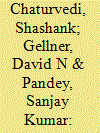

|
|
|
|
|
| Summary/Abstract |
The city of Gorakhpur presents what may be a unique, and is certainly an unusual, configuration of religion and politics. The sitting MP from 1998 to 2017, Yogi Adityanath, a Hindu monk, had one of the safest seats in India and won five parliamentary elections in a row, a career that culminated in his appointment as the BJP Chief Minister of Uttar Pradesh in 2017. Adityanath was both an effective constituency MP and the head of a thriving Math (Hindu monastic temple). Gorakhpur used to be famous for its lawless image and gang warfare. We seek to explain how politics in Gorakhpur have evolved through three distinct periods: (1) Congress hegemony and Hindu-Muslim harmony at the local level; (2) intensified caste competition and the rise of muscular politics; (3) the impact of new caste politics (with the rise of caste-based parties such as the SP and BSP), with the Math as the focus of Gorakhpur’s ever-stronger Hindu-based political identity. The BJP’s loss of the Gorakhpur seat in 2018, in a by-election consequent on Adityanath’s elevation to Chief Minister of UP, may be interpreted as a (probably temporary) rejection of the BJP, but it does not represent a loss of influence by the Math.
|
|
|
|
|
|
|
|
|
|
|
|
|
|
|
|
| 8 |
ID:
165246
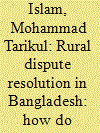

|
|
|
|
|
| Summary/Abstract |
The rural poor and other marginalized people in Bangladesh are caught in a quandary. Neither the formal judicial system nor informal dispute resolution through local tribunals, called Shalish, is able to meet their needs. The formal system is hardly accessible and affordable to them and suffers from millions of pending cases. Informal dispute resolution through Shalish is notorious for unfair decisions based on local power structures and backward norms, as well as draconian enforcement practices. To remedy this situation, a 2006 law has reformed and redesigned Shalish under the guise of village courts. These village courts were introduced as an accessible, fair and affordable alternative to both the formal judicial system and traditional Shalish, but experience since 2006 has shown that they have their own flaws and require further reform. Drawing on popular perceptions in two Bangladeshi villages, this study finds that more attention should be paid to access for poor and otherwise vulnerable people, procedural fairness shielding litigants from local power structures, and matters of effectiveness. Only then can village courts truly fulfil their promise of providing redress for those most in need of social justice and human security.
|
|
|
|
|
|
|
|
|
|
|
|
|
|
|
|
| 9 |
ID:
165247
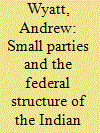

|
|
|
|
|
| Summary/Abstract |
Political parties have proliferated in India since the 1980s. A marked feature of the growth of parties has been the competitiveness of regional parties. Political entrepreneurs have broken away from established parties and formed separate parties that have competed at both state and national levels of the Indian political system. A few of the newly formed parties became strong competitors in their home units, sometimes leading state governments, demonstrating that they were large parties in their own region. A larger number of regional parties won representation in the Lok Sabha after 1989, but most of these newer parties, and some of the older ones, remained small. In the context of coalition politics many small parties were welcomed into national coalitions. Yet a lack of Assembly seats usually resulted in small parties being excluded from government at the state level. This article develops a typology that distinguishes small parties, active in national and state elections, from the larger regional parties and the hundreds of smaller parties registered with the Election Commission. The wider significance of the small parties is assessed in relation to party system change and the everyday conduct of politics.
|
|
|
|
|
|
|
|
|
|
|
|
|
|
|
|
| 10 |
ID:
165250
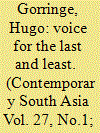

|
|
|
|
|
| Summary/Abstract |
Between 2009 and 2014, Thirumavalavan, the leader of the largest Dalit party in Tamil Nadu, served as an MP in Delhi. This paper draws on research with the Viduthalai Chiruthaigal Katchi (VCK or Liberation Panther Party) to raise a number of key questions about representation and democracy in a multi-level federal system. Although they are a minor party, their experience of national politics offers insights into the workings of party systems in India. The paper considers the extent to which they are constrained by alliance partners and political rules-of-the-game. It then considers the question of representation, and asks what the VCK managed to achieve in Thirumavalavan’s constituency of Chidambaram and the extent to which they could raise issues at the national level both through formal and disruptive means. Finally, the paper reflects on the advantages and disadvantages for a small party of having a foothold in the Centre and draws out the lessons of the VCK’s experience for our understanding of Indian politics.
|
|
|
|
|
|
|
|
|
|
|
|
|
|
|
|
|
|
|
|
|